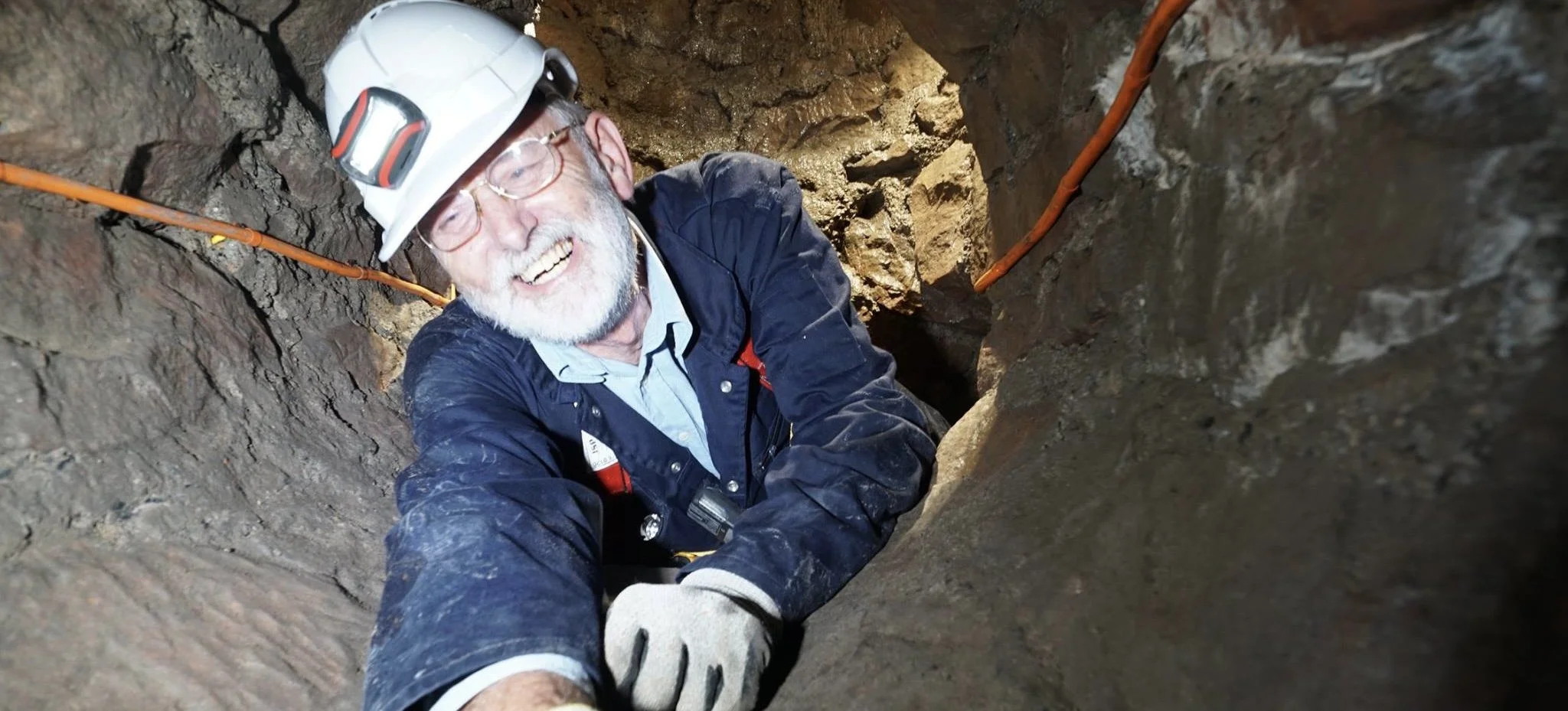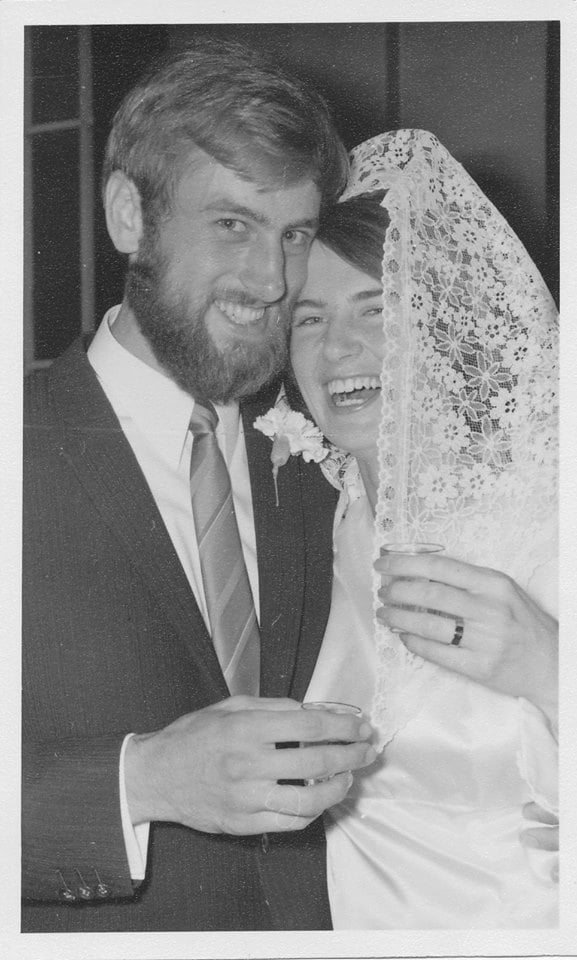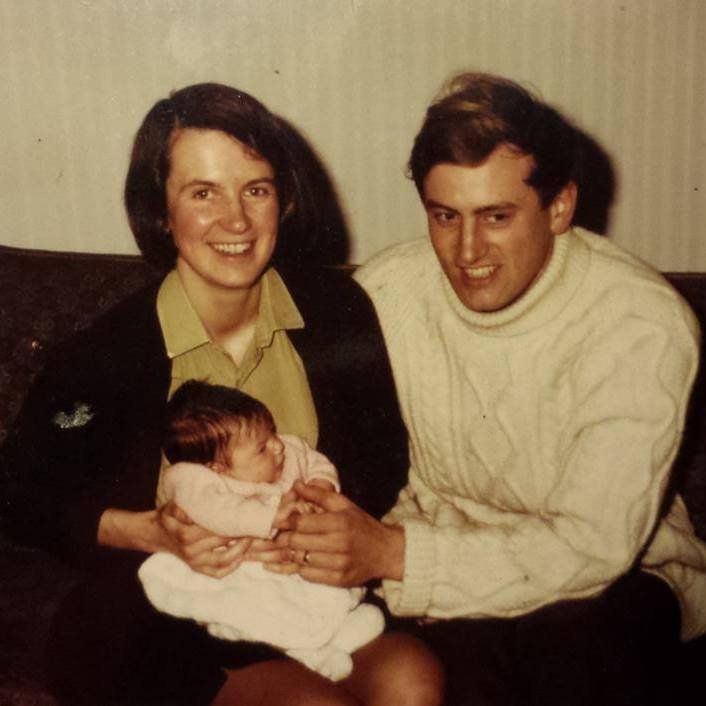Bridge of the Month 142 is Bill Harvey himself, in the form of a short autobiography written by Bill a few months ago. This concentrates on the personal and family side of his life, which will be less familiar to BoM readers than his professional achievements. The latter are also more likely to be covered elsewhere.
This conception of Bill as a bridge was his own. In summer 1989 he and Sue travelled to East Germany. The border to Hungary opened while they were there, but the people they were visiting did not know. In November that year the Berlin wall came down. In a church in Stralsund Bill found a poster of hymns and prayers around the theme of people as bridges. One struck him in particular: "Herr, gib mir Mut zum Brücken bauen." Lord, give me the strength to build bridges.
Hamish
It seems reasonable to start with my grandparents, the Harveys and the Spinks.
The Harveys were classical small business Tories. Pop was a violinist and had a small orchestra. When Dad was born he had to settle down and became musical director of a big cinema in Doncaster. That job vanished at a week’s notice but as a grammar-school boy he settled into a second career as a civil servant. Grandma was a hairdresser and ran two salons in Doncaster.
The Spinks were as different as could be. Pop (Ezra, what a name) was a good deal more intelligent than the Harveys, but didn’t get the breaks. He left school at 14 and at 15 lied about his age and signed up for the First World War. Between the wars he worked as a platelayer for LNER but continued in the RE reserve so in 1939 he was off to war again, real age 40, recorded age 44. Captured in Tobruk in 41 he spent 5 years in a PoW camp. You will gather he was a hero of mine. Grandma Spink worked as a cleaner.
Mum and dad were both born in Feb 1922. Dad followed his father into Doncaster Grammar School and signed up for pilot training in the Fleet Air Arm. Failing the transfer from Tiger Moth to Bulldog he was young enough to leave and spent the war building aircraft instead of flying them. Mum was so short sighted she couldn’t see the blackboard at school. She learnt to write beautifully but little else. At 14 she was an apprentice grocer at Meadow Dairy, packing butter and sugar for sale from bulk deliveries. She too built aeroplanes in the war and that is where she met Dad. They waited for Pop Spink to get home to get married in Feb ‘46 and I was born in March ‘47.
Like the dutiful grammar school boy he was, dad cast aside the mechanical work he loved and took a besuited office job at Briggs Motor Bodies. He was quickly whisked up into national service. He was away for much of my first two years.
My memories begin with our house in St Hilda’s Road, bought and mortgaged by Grandma Harvey as a wedding present. Visits to the Spinks in their railway cottage were rather more frequent than to the Harveys in their rather more up-market semi. Holidays were taken by bus, usually to Bristol where we stayed with one or other of my many relatives. Grandma Spink had 13 siblings, the youngest was younger than my mum.
The important thing about Bristol was my introduction to engineering. Paddle steamer outings to Weston, a visit to Filton with Uncle Frank to see the Brabazon, but most of all a visit to Clifton Suspension Bridge after which (at the age of seven) nothing else would do but to build bridges.
When we got home and I told pop Spink, his immediate response was that I needed to go to university and be a civil engineer. Neither my parents, nor my middle class grandparents would have thought of such a thing.
I went to Beechfield Junior school. Again, Dad and Pop Harvey had both been there and Dad knew some of the older teachers. We had assembly every morning and learnt a new hymn every 2 weeks so Mr Burley, the head, could stand and say ‘we will sing Almighty, Invisible…’ and we would. Miss Clarke came round the assembly one morning and singled out a few of us as potential choristers at Doncaster Parish Church. My love of singing was secure.
In the final, 11+, year, Miss Clarke had a class of 48 boys from the rough end of Doncaster and sent 47 on to Grammar school. There was a little disappointment in the family that I insisted on taking my place in the new Technical High School set up by Mr Semper, but what a joy that was.
Meanwhile, Briggs had been bought out by Ford, and Dad was offered a worthwhile promotion that entailed a move to Essex. In the course of that move, Mum, brother Bob and I spent 4 months living with my Spink grandparents in their 2-bed prefab. Uncle John and his very small twin children, Paul and Josephine were also staying there. That was quite a business and only worked because John was working nights.
In Jan ‘59 I started at Sweyne school in Rayleigh and faced a whole new world surrounded by girls. Making mistakes took on a whole new layer of embarrassment, but I came to love the shared community. I played rugby with the school and in the evenings joined the Air Training Corps in Billericay. That involved some serious time management, doing homework in the playground at lunchtime and on the train home in the evening. It gave me to opportunity to learn to fly gliders, though, which was wonderful. Don Stembridge, the PE teacher, organised a week of cruiser sailing, another joy.
Singing continued to be a treasured part of life, be it in school choir or the multi-language folk choir set up by the language teachers. At A level I did pure maths, applied maths and physics, but also slotted in an AO in numerical analysis using handle turning calculators to test tables for consistency and carry out fancy interpolation and extrapolation.
In 1965, I moved back to Yorkshire at Leeds University. A really good choice on my part. The course was intense but several of the staff became longer-term friends and being in Prof. Evans tutorial group taught me to formulate ideas and speak up, whoever might be listening.
‘67 was a momentous year. I signed up to help with the freshers’ conference. In refectory, on the first night, the most beautiful girl I had ever seen sat down across the table. Courtship through a stressed working year wasn’t easy and didn’t run entirely smoothly but by the time we graduated Sue and I were committed to one another. I reckon that cost me my first but was worth every bit.
I was planning to leave and start work, but Evans suggested I should stand as president of the engineering society, which was code for to do a PhD, for which he had grants in his gift. By that time, Sue was committed to spend a year teaching in Scarborough, but at the end of the year she also started a PhD (she did get a first, in a department that had only given one in the past four years).
I learnt a lot through my PhD years, though there was only a slim and relatively low-value thesis. By the time our grants ran out in September ‘71 Sue was pregnant, and I needed a job pdq and preferably in Leeds.
My network gave me wind of a job with Leeds city engineer. I walked down the road and beat on the door and was given a job to start 3 days later. Phew. Again, not building bridges but life.
With a loan from Mum and Dad we bought a terraced house in Otley and moved in just in time to take the new Elisabeth Jane Harvey home there.
1973 we moved East and I worked on the Humber Bridge then Ouse bridge while living in Leven, just east of Beverley. David Peter Hamish Harvey joined us in March 1975 but not before Sue had been diagnosed with MS and had three weeks of almost total paralysis.
1976 we lived the summer in Little Trochry near Dunkeld while I worked building a bridge. Liz reached school age and the pressure of family began to bear.
I had six months travelling weekly to Bedford while the family stayed in Leven. A bit scary when Sue might be attacked by MS at any time. I got transferred back to the Humber Bridge but it was only temporary so I faced up to giving up bridges and found a job at the University of Dundee. [This decision must have been hard, but readers will be aware that Bill did not exactly “give up bridges”, and even managed to fit some bridge building into his academic life with the Aberfeldy footbridge. - Hamish]
We bought a stone terrace house in Newtyle, but had to deal with a lot of rebuilding. Five years of that and as the house came to fruition, a farmhouse came up just out of the village. The value of the village house had risen from £5,000 to £25,000 so we bought a farm house with ¾ acre of garden where Sue could fulfil a dream as a smallholder. Pigs, goats, hens and a 1/4 acre of vegetables, while I set to on another pile of semi-derelict building to turn into a home around us.
The big trouble with that was it was very dark in the winter. Once the kids were travelling into Dundee to school and Sue was alone through a long day she began to get depressed. In 1990 we gave up and moved into Dundee. Liz was only with us for a short year before leaving home. Sue met Geoff Ashcroft, a medievalist from the University of St Andrew’s and embarked on an MPhil.
In 1994, David Hamish (he was still David then) went off for a pre-university year with Arup.
Meanwhile, Sue finished her MPhil and embarked on a PhD but in ‘95 I confused the issue by getting a chair in Exeter. I moved south and Sue stayed in St Andrew’s, getting a solid start on the PhD but by the end of the year it was clear that her sharp brain had blunted. We never knew whether that was the MS or the onset of vascular dementia which was identified properly around 2005.
In 2000 the University of Exeter and I fell out. I took early retirement and set up in business in such a way that I could give increasing care as necessary for Sue.
Sue’s decline was progressive, but slow. She became unable to plan and carry through even a simple meal. Her leg power declined, though she never became unable to walk around the house and enjoy gardening. There were the odd shocks like when she remembered ordering multi packs of vegetable plants but instead ordered a full pack of each. 2 people cannot eat 10 cabbages!
Caring for Sue and keeping work up was a major challenge but provided the resources that made it possible for us both to go to New Zealand every year to visit Liz and the grandchildren there.
In 2011 Hamish had joined me first in Bill Harvey Associates and later in Obvis. It has been a joy working with him in the past few years and a comfort knowing he can continue to run the businesses in his own way.
In late November 2017, Sue fell in the kitchen and broke her hip. They gave her a new one but on 24th Dec she got hit by a thrombosis that took her in an hour. Great sadness tinged with relief that she didn’t have to face long-term dementia or the endless fear of me dying of something and leaving her without care. We had no savings because every penny had been spent giving her the best life I could.
I had a long cherished hope for maybe 10 years to enjoy travel and other freedoms. 5 was what I got and I am grateful for that.
It has been a life full of joy. Judging from the messages I have received over recent months, that joy has been communicated to others. This was written with the aim of filling in some of the gaps for friends who mostly knew me in only one part of my life. When you read this, I will be gone. Please celebrate a life well-lived and full of joy.










